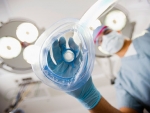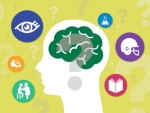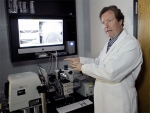Displaying items by tag: school of medicine
Tagged under
Tagged under
A new eight-week FreshStart! program is set for Jan. 21-March 10 to help cancer survivors make healthy lifestyle changes.
Tagged under
With more than 162,000 square feet, the new UAB Hill Student Center is the living room of the university and provides places for students to congregate, eat and study, making it their home away from home.
Tagged under
- release
- hill student center
- facilities
- sustainability
- admissions
- career and professional development
- student media
- college of arts and sciences
- school of education
- school of nursing
- school of public health
- school of engineering
- collat school of business
- school of health professions
- school of dentistry
- school of medicine
- honors college
- school of optometry
- university events
- uab libraries
UAB-led research shows how methylating an RNA binding protein leads to alternative RNA splicing. Mutant enzymes are often found in blood cancers.
Tagged under
 Many patients diagnosed with type 1 diabetes as adults do not fit the standard profile for a diabetes diagnosis; they are younger, are relatively fit and have little if any belly fat.
Many patients diagnosed with type 1 diabetes as adults do not fit the standard profile for a diabetes diagnosis; they are younger, are relatively fit and have little if any belly fat.
Tagged under
A UAB study reconfirms that single-dose azithromycin remains an effective treatment for chlamydia, especially when drug adherence is an issue.
Tagged under
 The intensive intervention was four hours a day, five days a week, for a total of 200 hours of face-to-face instruction, and neuroimaging revealed brain connectivity changes.
The intensive intervention was four hours a day, five days a week, for a total of 200 hours of face-to-face instruction, and neuroimaging revealed brain connectivity changes.
Tagged under
Endorsed by the ASA, UAB’s Department of Anesthesiology and Perioperative Medicine and the Office of Interprofessional Simulation will now offer courses for Maintenance of Certification in Anesthesiology.
Tagged under
From rapid diagnostic tools to next-generation therapies, UAB researchers are leading a multidisciplinary effort against traumatic brain injuries.
Tagged under
 Neuron-derived microRNAs obtained from blood samples may correlate with treatment response and could aid the search for new therapeutics.
Neuron-derived microRNAs obtained from blood samples may correlate with treatment response and could aid the search for new therapeutics.
The Central Alabama Caribbean American Organization shares Caribbean culture and is a resource for area students from the Caribbean.
Tagged under
With significant implications to its student enrollment and economic impact in the region, UAB’s partnership with INTO University Partnerships will increase access for international students to one of the nation’s most diverse college campuses.
Tagged under
UAB researchers say how long your eyes take to adjust to the dark may be a risk factor for age-related macular degeneration.
Tagged under
UAB’s J. Crawford Downs, Ph.D., has received another grant to bring the relationship between age, intraocular pressure and glaucoma development into focus.
Tagged under
Tagged under
James Landis’ personal cardiologist says his 88-year-old patient’s heart went from roaring like a freight train to humming like a fine-tuned engine after procedure.
Tagged under
Research underway in UAB’s Mood Disorders Program is investigating promising new therapies, including novel drugs and low field magnetic stimulation.
Baby Friendly USA has recognized UAB Hospital’s efforts to educate and support breastfeeding mothers.
Tagged under












 A new surgical robot helps UAB physicians add a new technique for preparing for epilepsy surgery.
A new surgical robot helps UAB physicians add a new technique for preparing for epilepsy surgery.






